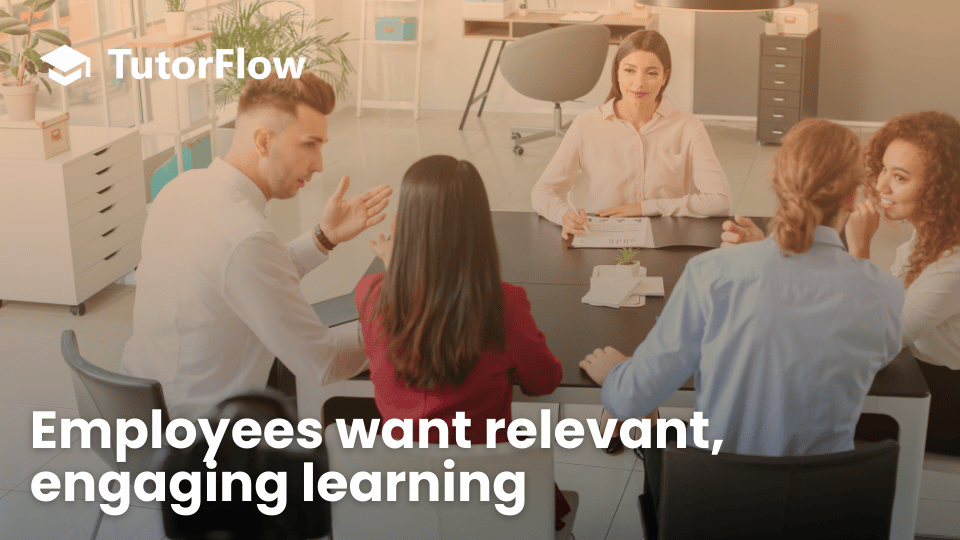
Think back to the last workplace training you attended. Did it spark growth, or feel like another box to check? For many employees, training still feels disconnected from their real work. That disconnect is costly: when training fails, organizations lose productivity, motivation, and ROI.
Recent studies make one thing clear: HR training is at a turning point. Employees now expect learning that's personalized and relevant, not one-size-fits-all. Business leaders demand programs that adapt as quickly as their strategies evolve.
"The only thing worse than training your employees and having them leave is not training them and having them stay." — Henry Ford
And HR teams face growing pressure to prove real, measurable impact rather than relying on surface-level engagement metrics.
In this article, we explore the latest research, highlight what's working, showcase real-world examples, and share TutorFlow's perspective on where HR training is headed.

Why Traditional HR Training Is Losing Effectiveness
Traditional HR training methods are struggling to keep up with the pace of workplace change. As business priorities shift faster than ever, many training programs still rely on outdated, one-size-fits-all approaches that fail to meet employee expectations or deliver measurable results.
Training fatigue is growing
A 2024 Gartner survey shows that over 40% of employees consider training irrelevant to their daily work. Hybrid programs have expanded, but much of the content still feels disconnected from job realities. When employees don't see value, engagement plummets.
Reskilling speed matters
According to the OECD Skills Outlook, digital fluency, adaptability, and resilience are now core capabilities. Traditional multi-year training cycles can't keep up. HR leaders are being asked to reskill faster than ever.
ROI is hard to prove
Despite modern learning platforms, fewer than 35% of HR leaders confidently measure training impact (eLearning Industry). Without clear links to performance, defending learning budgets becomes difficult.

Evidence-Based HR Training Strategies That Work
Organizations are shifting away from outdated, one-size-fits-all programs toward data-driven, personalized learning strategies. Backed by research and real-world success stories, these approaches are helping HR teams create training that actually sticks, drives engagement, and delivers measurable business impact.
Microlearning boosts retention
The Association for Talent Development reports microlearning adoption is up 28% in eight years. Breaking training into short, targeted sessions increases retention by up to 80% and helps employees apply knowledge immediately.
Social and peer-based learning drives relevance
A Harvard Business Review study finds that collaborative learning improves outcomes. Peer mentorship, group problem-solving, and team-based learning make content more relevant and easier to apply.
Skills-first frameworks make impact measurable
The World Bank highlights a shift from course completion metrics to skills-based outcomes. Tracking skill acquisition makes it easier for HR teams to prove growth and ROI.
AI-driven personalization scales learning
Nearly half of HR teams now test AI-powered personalization (eLearning Industry). Adaptive training modules that match employee goals help close skills gaps faster and improve perceived value.

Case Studies: Organizations Leading the Change
Real-world examples show how forward-thinking organizations are reinventing HR training to build agile, future-ready workforces.
Accenture: Accenture LearnVantage delivers personalized learning paths in AI, cloud, and leadership, demonstrating how adaptive training can upskill entire workforces.
Schneider Electric: The Schneider Digital Academy offers on-demand technical and soft-skills courses, aligning personal growth with business objectives.
Coursera for Business: Enterprises leverage Coursera for certifications, role-based pathways, and performance analytics, balancing flexibility for employees with accountability for HR.

The Future of HR Training
The message is clear: employees demand relevant training, leaders need measurable results, and organizations must evolve to stay competitive.
- Microlearning makes content stick
- Social learning improves collaboration
- Skills-first strategies make impact measurable
- AI personalization delivers scale
Forward-thinking companies are already adopting these strategies. Those who act now will build stronger, more resilient workforces.
Start Building Better Training Today
The future of HR training isn't about delivering more courses — it's about designing training that drives results.
With TutorFlow, you can create personalized, data-driven programs that engage employees, empower leaders, and deliver measurable business outcomes.
Start for free today and transform your training programs.



